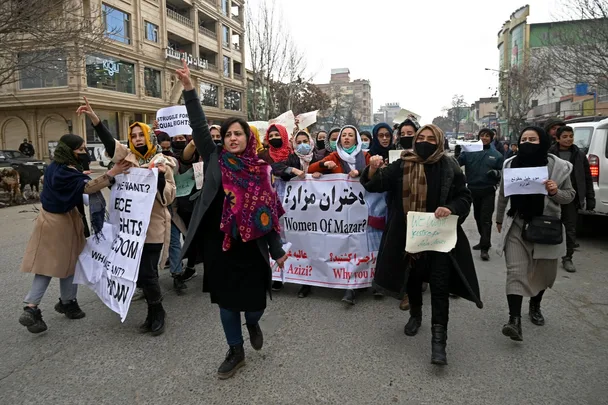In August 2021, an image of 640 people crammed into a US military cargo plane sent shock waves around the world. Video footage depicted people clinging to the sides of a moving aeroplane, desperate to flee Afghanistan as the Taliban regained power.
It had been 20 years since the militant group last ruled the country – ousted by the US-led invasion in 2001, then regaining control in 2021 during the final withdrawal of Western troops.
In the months that followed those gut-wrenching images, the international spotlight on Afghanistan faded but the crisis continued. Some Afghans navigated new lives in new countries; others were stifled under a fundamentalist regime in their homeland.
Research by Women for Women International found that 97 per cent of women in Afghanistan are experiencing restrictions on their freedoms, and the UN says 95 per cent of all Afghans do not have enough to eat.
Yet even in the face of terror and trauma, Afghan women are unified by the courage coursing through their veins. “We’re so much more than the politics that we’ve endured,” says Diana Sayed, a human rights lawyer, former Afghan refugee and CEO of the Australian Muslim Women’s Centre for Human Rights. “We just want the dignity to drive our own lives. We are the leaders in our homes; we are the leaders in our communities; we are the leaders in the diaspora … I’m really proud of the history of my [female] ancestors who have fought back against so much. They not only survived but thrived; they’ve not only existed but continued to resist.”

The woman who fled: Judge Mirman Dil’Aram Abid
A few months before the fall of Kabul, Judge Mirman Dil’Aram Abid received a letter from the head of the police force in her province of Takhar, northeast Afghanistan. “It warned about some threats and plans to kill or kidnap me,” she remembers.
Stoic and strong, the 63-year-old had enjoyed an esteemed judicial career spanning 32 years, which saw her investigate and sentence members of the Taliban for corruption, terrorism, murder and rape.
With these criminals suddenly free and seeking vengeance, the judge went into hiding in Kabul, before an intricate mission to evacuate female judges – involving the International Association of Women Judges and its Australian chapter – helped Dil’Aram leave with a few family members. Dil’Aram and 16 other female judges have since settled in Australia.
“Coming to a new country is difficult, but I am starting a new life here,” she shares. “I never thought that one day I would be in this situation. It’s very upsetting to be away from my home country, from my children and my relatives. But the good thing is that there are no threats here and I do not have to deal with the Taliban or even look at their damn faces.”
Dil’Aram has a permanent protection visa and lives in Melbourne with two of her daughters; her stepson, his wife and children live nearby. Now she’s desperately trying to bring two of her remaining daughters and grandchildren to Australia. “Some former prisoners managed to find one of my daughters in Afghanistan and they asked for my address,” she says. “In terms of her safety, it’s not a good situation.”
By Dil’Aram’s side on this journey are former Victorian judges Frances Millane and Pamela Tate, with whom she has found familiarity and friendship. “They have supported me in any way they could,” she says. “They even invited me to events during the month of Ramadan.”
Yet for Dil’Aram, finding peace in Australia has been tinged with great sacrifice. Her beloved career was ripped from her overnight, and while she’s currently taking English and computing classes, she dreams of using her legal and negotiation skills once more. Says Millane, “We are exploring whether there may be avenues for Dil’Aram to have a role in dispute resolution, especially in the Afghanistan community.” Adds Dil’Aram, “I would be delighted [with that]. If I stay home and do nothing, that will make me feel tired and depressed. It doesn’t matter how old we are, if we can still make a contribution we should do that.”
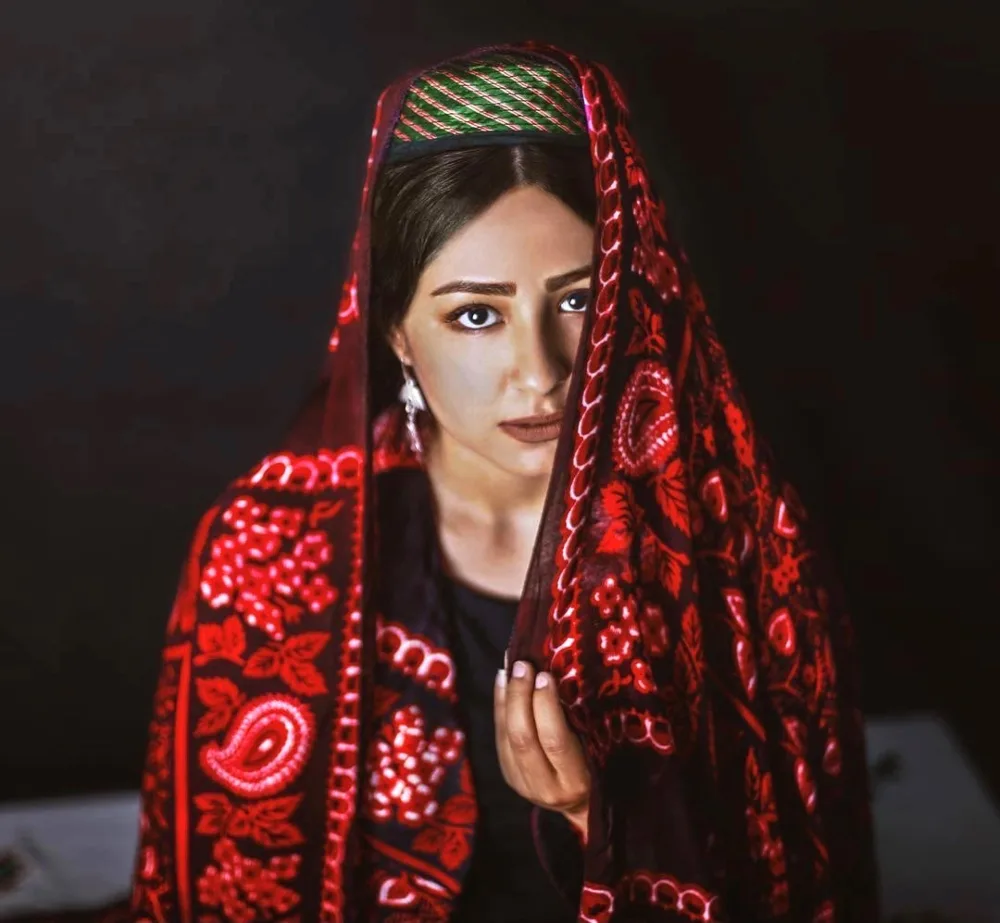
The Actor: Hasiba Ebrahimi
Hasiba Ebrahimi is a recognisable face in Afghanistan. In 2014, the actor starred in acclaimed Afghan-Iranian romance A Few Cubic Meters of Love, while in 2019 her drama Hava, Maryam, Ayesha premiered at the Venice Film Festival and was championed by Angelina Jolie.
Her profession as a woman in the media, however, was not always viewed favourably by Afghan society. Ebrahimi recalls one project where the crew found a grenade planted on set in an effort to shut down filming.
Mid-last year, the 25-year-old was in Sydney, Australia, visiting her sister when the conflict in Afghanistan began to escalate. “I got a call from the head of the police,” she recalls. “They told me, ‘If you come back, we are not going to support you. [We’re] not going to guarantee your life.’”
Forced to suddenly start over in a strange new world – missing her family, the mountains and her career – Ebrahimi struggled to eat or sleep.
“I had long-term depression,” she says. “I didn’t [get to] say goodbye to my family, to my friends. I didn’t bring my stuff that I like. I didn’t leave Afghanistan with this idea that I’m going to stay here. So it was a hard situation for me. For a while I was thinking, ‘Is this the life that I accept? I mean, Australia is a beautiful country. Everything is peaceful. But is this my place?’”
Slowly, the actor has started to find work and reclaim her sense of self, though she still awaits stability and permanent protection. “Because I’m on a bridging visa I can’t travel, and I just lost four projects, including a Hollywood project.”
Locally, she’s been cast in Dorr-e Dari, a Persian poetry theatre production that will play at the Arts Centre Melbourne and the Sydney Opera House, both in September. “I’m just happy to be working,” she says. “It makes me feel alive.”
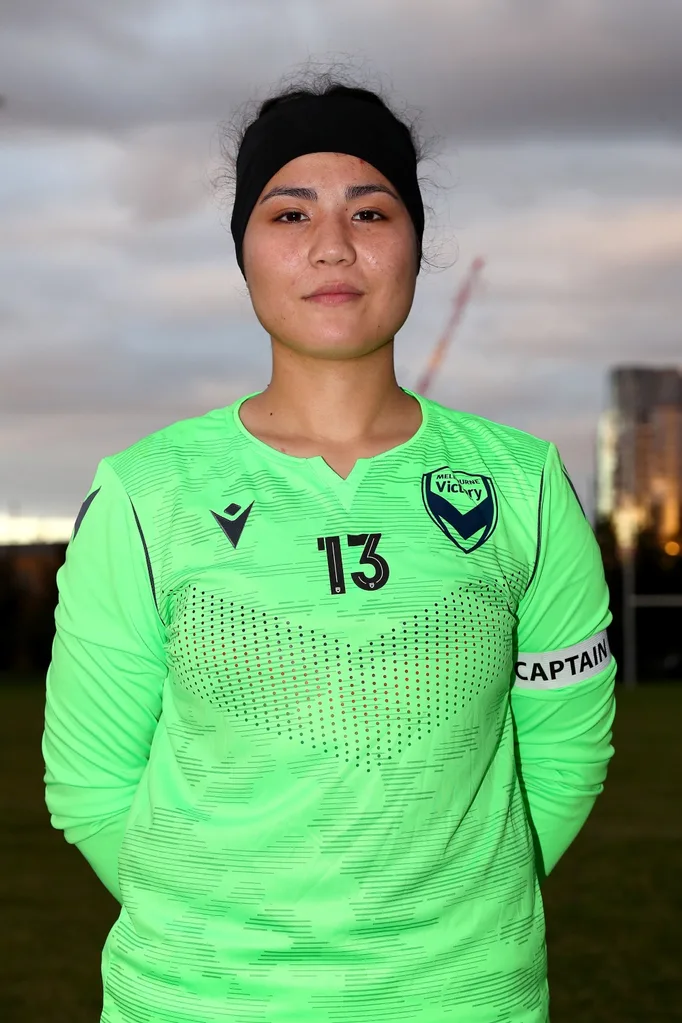
The Footballer: Fati *
Fati has had a triumphant weekend. “We won 5-0,” says the captain of the Melbourne Victory Afghan Women’s Team proudly. Last year, as a professional soccer player on the Afghanistan women’s national football team, the 20-year-old would train with armed guards positioned around the field. “Every night there was news of women athletes, reporters, doctors and politicians being killed,” she recalls.
When Fati found out that the Taliban was trying to track down her teammates and her, she buried her soccer jerseys and medals in her backyard. “I had a feeling of guilt because [I was] the problem-maker for my family … They were supporting me so I was putting them at risk,” she says.
Fati was ultimately part of a bold rescue operation led by former Socceroo and refugee advocate Craig Foster, Olympian-turned-politician Zali Steggall, and a host of human rights lawyers who successfully evacuated about 50 Afghan athletes and their families to Australia.
She travelled with three siblings, leaving behind her parents and five-year-old sister – who were separated from the group at the airport and beaten by the Taliban. “The first thing I felt here was a security that I never felt back in Afghanistan, because every day I doubted if I would be alive,” Fati says. “Yet I’m feeling much more responsibility because my siblings [aged 24, 18 and 16] are here too. I need to support them with learning English and going to school and university.”
Since resettling in Melbourne, Fati has worked in a restaurant and completed a leadership course, but the place she feels most at home is on the soccer field. “The feeling is different here because you can be yourself, you can play like you are free, and you have more opportunities,” says Fati, whose national Afghan team was taken under the wing of A-League club Melbourne Victory and is now competing in Victoria’s State League 4 West. “It’s beautiful. We have our dreams and they are coming true.”
*Surname has been withheld.
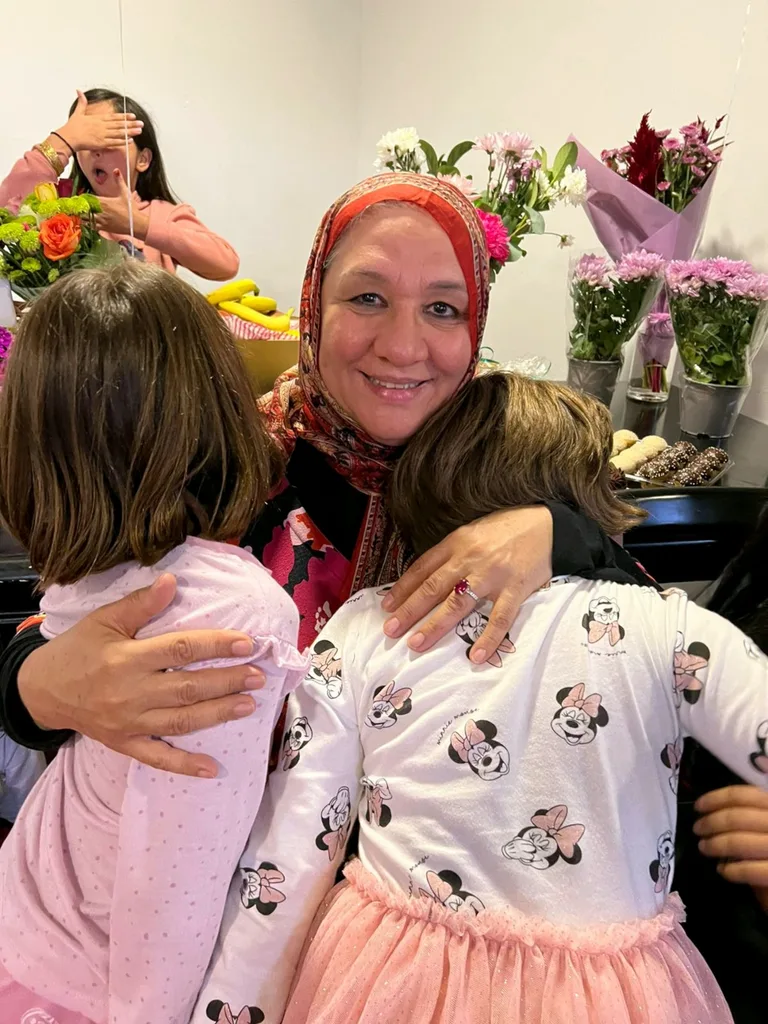
The Mother to Many: Mahboba Rawi
On September 24, 2021, Mahboba Rawi waited at Sydney Airport, anticipation rising inside her. She was there to meet 11 orphan Afghan children, who had been guided in a secret mission from Kabul into Pakistan, and ultimately to safety in Australia.
Rawi, who was born in Kabul before fleeing to Pakistan as a teenager, resettled in Australia and founded not-for-profit Mahboba’s Promise in 2021. Today she runs four orphanages – or “hope houses” – across Afghanistan. “Meeting the children that day was a dream come true,” Rawi says. “There’s also a sense of responsibility because I am the only mother they know. And they came from trauma.”
The children – 10 girls and one boy, ranging from a six-year-old to teenagers –moved into a five-bedroom home that Rawi, her colleagues and friends had decorated in happy colours. “The one thing I have for them is love, and I think it worked like a medicine, the language of love,” says Rawi.
Over the past 11 months, the children have been going to school, learning English, taking swimming lessons and splashing around at Aussie beaches. “I made the mistake of taking them to McDonald’s and now they keep asking to go back,” laughs Rawi. “The girls are playing with lipstick and jewellery, they are enjoying the freedom they have … They [come from] a country dominated by men, but these are loud, very strong-minded girls.”
Today, Rawi is foster mother to all the children; eight still live with her while three of them live with her sister. “I hope I will be alive for many, many years and see them finish university and become good leaders,” she says. “Every night I ask them all to leave their doors open. I go and cover them with blankets, sit beside them and think about their futures. Sometimes I burst into tears because they lost their [parents]. But when they sleep, they are like angels.”
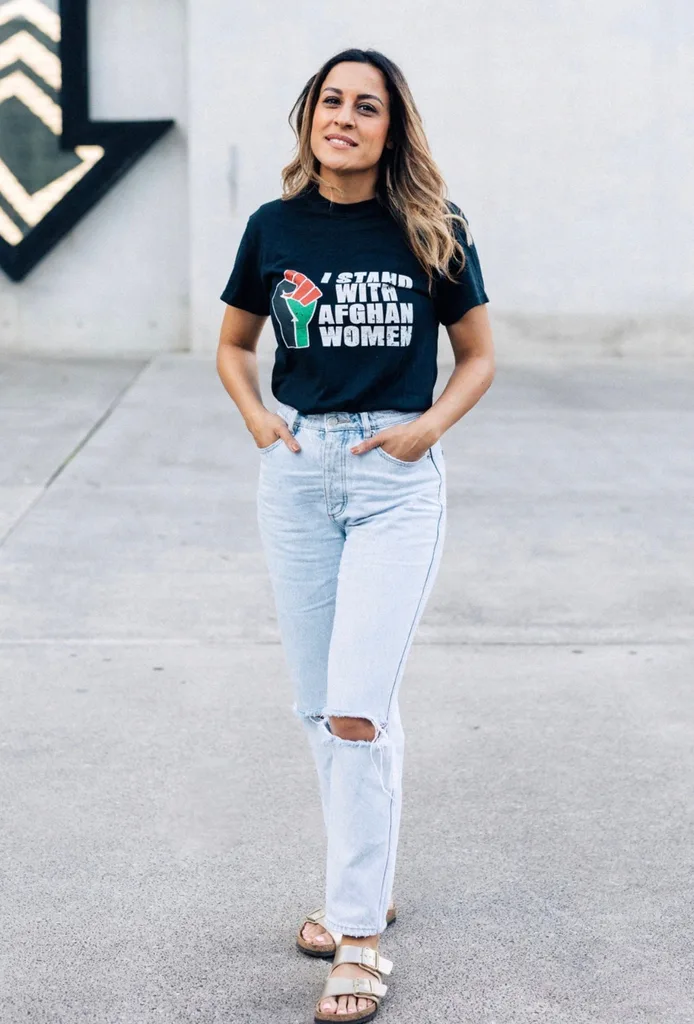
The Australian-Afghan Advocates Diana Sayed, Gula Bezhan and Sanam Wahidi
While lawyer and CEO Diana Sayed was at the forefront of the Action for Afghanistan movement in Australia last year, she’s quick to emphasise that it was a collective effort.
“We were an ad hoc group of lawyers, public health professionals, teachers, academics, elders and youth community organisers,” she says, highlighting in particular the work of Mariam Veiszadeh and Shabnam Safa. “We were a collective of concerned people from Afghanistan, many of us ourselves refugees, who trauma-bonded and came together … We wanted to see some sort of justice, accountability and action from the Australian government, given our 20-year [military] engagement [in Afghanistan].”
The #ActionForAfghanistan hashtag went viral, and the group’s tireless, ongoing work saw the government announce in March an additional 16,500 humanitarian visas for Afghans. “Our next huge objective is around securing a commitment for pathways to permanent protection for those people who came to Australia and are still on Temporary Protection Visas,” says Sayed. “There are about 8000 who are here living in limbo.”
Gulghotai “Gula” Bezhan, founder and CEO of the Afghan Women’s Organisation Victoria, has turned her attention to grassroots action. “I’m working on an underground education project in Kabul,” she shares. “In the back of my house in Afghanistan I am running a ‘religious’ class for girls and young mothers, because when the Taliban see that they [don’t mind]. But when you go inside it’s [actually] numeracy and literacy lessons.”
Bezhan’s daughter, youth activist Sanam Wahidi, 21, worked with her mum last year to create 600 care packs for Afghan refugees arriving in Victorian hotel quarantine. “We provided culturally appropriate food and clothing,” says Wahidi. “If we could provide them with that small sense of home, we knew it would go a long way. Right now we are working with Afghans who have come to Australia and, despite the trauma of leaving their country, they’re always happy and willing to learn,” she continues.
“I really fear for the future of women and children in Afghanistan, but I do have hope for humanity. If we can continue having a humanitarian lens and an acceptance lens, there might be some hope for a better future for Afghanistan.”
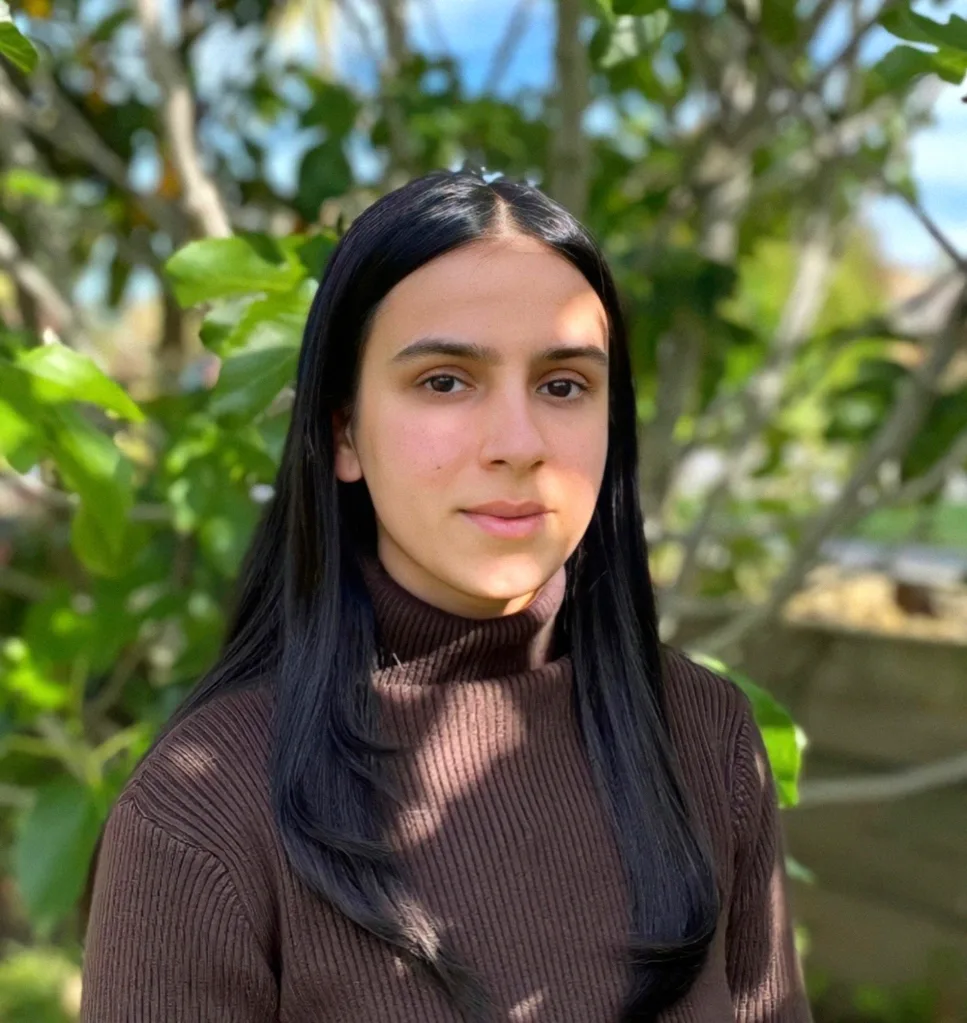
The Woman Left Behind: Asya*
When Asya, 33, looks back on her life in Afghanistan before August 2021, she describes it as “normal. People were living their life without any challenges.”
But after the Taliban seized power, everything changed. Asya, who lives in Nangarhar province and shares a home with her parents and eight siblings, was unable to flee. “I wanted to leave then and I still want to leave now, because I don’t feel safe,” she says. “Every girl’s life changed after the fall of Kabul … I’m feeling hopeless and helpless for myself and for my Afghan sisters.”
Asya laments that under strict Taliban rule, her younger sister cannot go to school. Women are not allowed to travel more than 72 kilometres unless escorted by a close male relative; they cannot sit with a man in a restaurant or park; and they must cover up head-to-toe in a burqa. “Whenever I wear a burqa, my headache starts and I feel I’m somewhere trapped.”
Fortunately, she continues to work for non-profit humanitarian organisation Women for Women International, where she garners insights into the wider crisis in Afghanistan. “At the moment, hunger is one of the biggest problems. Every day people starve, some are selling their children to survive,” she says. “We need outside support now. Food, emergency shelter, financial aid, hygiene items, medical items – all of these things are lacking, we need them for daily survival.”
*Name has been changed.
HOW YOU CAN HELP
Donate to or volunteer with organisations such as Mahboba’s Promise or Afghan Women’s Organisation Victoria. Or you can “sponsor a sister” through Women for Women International by providing a monthly contribution to support a woman in need.
This story originally appeared in the September issue of marie claire.
